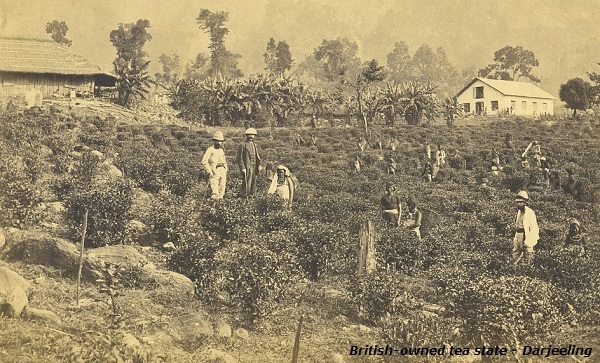
- Modern Indian History - Home
- Decline of Mughal Empire
- Bahadur Shah I
- Jahandar Shah
- Farrukh Siyar
- Muhammad Shah
- Nadir Shah’s Outbreak
- Ahmed Shah Abdali
- Causes of Decline of Mughal Empire
- South Indian States in 18th Century
- North Indian States in 18th Century
- Maratha Power
- Economic Conditions in 18th Century
- Social Conditions in 18th Century
- Status of Women
- Arts and Paintings
- Social Life
- The Beginnings of European Trade
- The Portuguese
- The Dutch
- The English
- East India Company (1600-1744)
- Internal Organization of Company
- Anglo-French Struggle in South India
- The British Conquest of India
- Mysore Conquest
- Lord Wellesley (1798-1805)
- Lord Hastings
- Consolidation of British Power
- Lord Dalhousie (1848-1856)
- British Administrative Policy
- British Economic Policies
- Transport and Communication
- Land Revenue Policy
- Administrative Structure
- Judicial Organization
- Social and cultural Policy
- Social and Cultural Awakening
- The Revolt of 1857
- Major Causes of 1857 Revolt
- Diffusion of 1857 Revolt
- Centers of 1857 Revolt
- Outcome of 1857 Revolt
- Criticism of 1857 Revolt
- Administrative Changes After 1858
- Provincial Administration
- Local Bodies
- Change in Army
- Public Service
- Relations with Princely States
- Administrative Policies
- Extreme Backward Social Services
- India & Her Neighbors
- Relation with Nepal
- Relation with Burma
- Relation with Afghanistan
- Relation with Tibet
- Relation with Sikkim
- Relation with Bhutan
- Economic Impact of British Rule
- Nationalist Movement (1858-1905)
- Predecessors of INC
- Indian National Congress
- INC & Reforms
- Religious & Social Reforms
- Religious Reformers
- Women’s Emancipation
- Struggle Against Caste
- Nationalist Movement (1905-1918)
- Partition of Bengal
- Indian National Congress (1905-1914)
- Muslim & Growth Communalism
- Home Rule Leagues
- Struggle for Swaraj
- Gandhi Assumes Leadership
- Jallianwalla Bagh Massacre
- Khilafat & Non-Cooperation
- Second Non-Cooperation Movement
- Civil Disobedience Movement II
- Government of India Act (1935)
- Growth of Socialist Ideas
- National Movement World War II
- Post-War Struggle
- Clement Attlee’s Declaration
- Reference & Disclaimer
Extreme Backwardness of Social Services
The Government of India spent most of its income on the army and wars and the administrative services and starved the social services.
In 1886, of its total net revenue of nearly Rs. 47 crores, the Governmental India spent nearly 19.41 crores on the army and 17 crores on civil administration but less than 2 crores on education, medicine, and public health and only 65 lakhs on irrigation.
The few halting steps that were taken in the direction of providing services like sanitation, water supply, and public health were usually confined to urban areas, and that too to the so called civil lines of British or modern parts of the cities.
Labor Legislation
In the 19th century, the condition of workers in modem factories and plantations was miserable. They had to work between 12 and 16 hours a day and there was no weekly day of rest.
Women and children worked the same long hours as men. The wages were extremely low, ranging from Rs. 4 to 20 per month.
The factories were over-crowded, badly lighted and aired, and completely unhygienic. Work on machines was hazardous, and accidents very common.
The Government of India, which was generally pro-capitalist, took some half-hearted and 'totally inadequate steps to mitigate the sorry state of affairs in the modern factories; many of the factories were owned by the Indians.
The manufacturers of Britain put constant pressure on it to pass factory laws. They were afraid that cheap labor would enable Indian manufacturers to outsell them in the Indian market.
The first Indian Factory Act was passed in l881. The Act dealt primarily with the problem of child labor.
The Factory Act of 1881 laid down that the child below 7 could not work in factories, while the children between 7 and 12 would not work for more than 9 hours a day. Children would also get four holidays in a month.
The Act also provided for the proper fencing around the dangerous machinery.
The second Indian Factory Act was passed in 1891, it provided for a weekly holiday for all workers.
Working hours for women were fixed at 11 per day while daily hours of work for children were reduced to 7. Hours of work for men were still left unregulated.
Neither of the two Acts applied to British-owned tea and coffee plantations. On the contrary, the Government gave every help to the foreign planters to exploit their workers in a most ruthless manner.

The Government of India gave planters full help and passed penal laws in 1863, 1865, 1870, 1873, and 1882 to enable them to do so.
Once a laborer had signed a contract to go and work in a plantation, he could not refuse to do so. Any breach of contract by a laborer was a criminal offence, the planter also having the power to arrest him.
Better labor laws were, however, passed in the 20th century under the pressure of the rising trade union movement. Still, the condition of the Indian working class remained extremely depressed and deplorable.